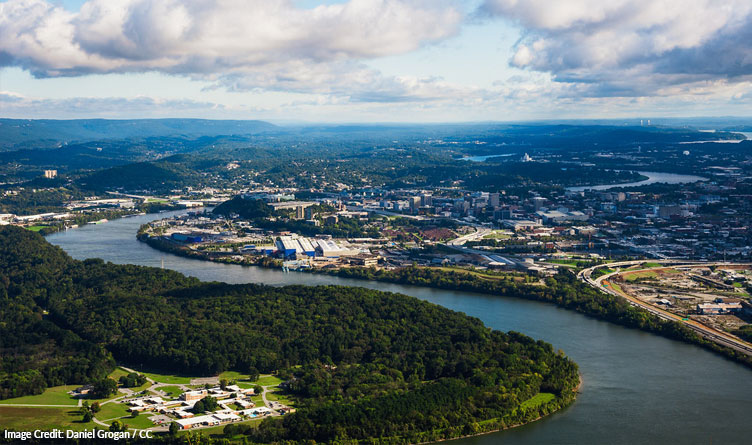Budget includes $10 million for paving roads, $33 million toward affordable housing, 3 percent cost-of-living increase for city workers, and no tax increase.
Photo: Chattanooga as seen from Pointe Park on Lookout Mountain. Photo Credit: Daniel Grogan / CC
Press Release –
The Chattanooga City Council on Tuesday approved Mayor Tim Kelly’s One Chattanooga budget on second reading, with $10 million in additional road paving, $33 million toward affordable housing, and $2 million toward homelessness prevention and rehousing efforts — with no tax increase.
Essential city workers, including sworn employees, will receive a 3 percent cost of living adjustment, raising the city’s minimum wage to $15.45/hour. Nearly 58 percent of the city’s operating budget will go toward continued funding for the first responders and essential workers at the Chattanooga Police Department, Chattanooga Fire Department, and the Department of Public Works.
The new budget — which covers July 1, 2022 through June 30, 2023 — is built around the One Chattanooga plan that Kelly unveiled at a State of the City presentation in the Spring.
The budget is available for the public to view at budget.Chattanooga.gov.
Public Safety
Nearly half of the city’s operating budget will flow into public safety this year, with the Police Department and Fire Department making up 46 percent of general fund expenditures.
This year’s budget will fund violence intervention programs, victim services, and CPD’s recently launched focused deterrence efforts and Crisis Response Unit. Funding is also set aside for a new executive director of community safety and gun violence prevention, a position that was planned months ago to help shape and lead implementation of the City’s plan for reducing violent crimes in the community.
The city will also continue to fund a number of existing initiatives that address the root causes of violence through education, jobs training, and social services, including the city’s Community Forward Schools initiative, the EMPACT program, and its support for the Construction Academy.
Housing and Homelessness
The budget includes $33 million to help address the city’s housing crisis.
Median housing prices have increased 80.7 percent since 2015, leaving 43 percent of renters defined as “housing burdened,” or spending more than 30 percent of their income on housing. And more than 20 percent of renters in Chattanooga are “housing insecure,” defined as spending more than half of their income on housing, placing them at severe risk of eviction and potentially, homelessness.
The $33 million seed investment will catalyze the city’s $100 million affordable housing initiative, which includes partnerships with the nonprofit, philanthropic, financial and homebuilding sectors.
The multi-pronged approach involves investing in programs that provide subsidies, gap financing, and down-payment assistance to begin filling an estimated housing gap of more than 5,000 homes across Chattanooga.
The budget also allocates more than $2 million toward homelessness prevention and rehousing efforts, including funding for the recently opened temporary sanctioned encampment, and the rehabilitation of a former hotel into permanent supportive housing.
Infrastructure and Neighborhood Livability
The budget includes a $131 million investment into infrastructure, including sidewalks, bridges, traffic signal synchronization, sewer, and stormwater projects. It sets aside $10 million for repaving roads, in fulfillment of the administration’s promise to invest $40 million into road repair over four years.
The city will continue to invest heavily in preserving and enhancing its green spaces, with $14.18 million going toward parks and outdoors. Chattanooga’s outdoor resources are among its greatest competitive advantages, serving as a critical economic driver and contributing to the city’s quality of life. Over the next year, the city will complete its master parks and outdoor plan.
Pay for Essential Workers
As a service-focused entity, about 62 percent of the city’s operational expenditures go toward employee pay and benefits.
The new budget also includes a 3 percent cost of living adjustment for city workers, including sworn employees, raising the city’s minimum wage to $15.45/hour. The city is also absorbing increases in health insurance costs this year to ensure that employees won’t see a premium increase.
The City will provide supplemental funds for federal Head Start workers to increase their minimum wage to $15.45 per hour, implement a new comprehensive pay plan, and help strengthen the city’s Pre-K programs.
The budget also includes a number of investments into a more effective and responsive government, including additional inspectors and specialists, additional truck drivers, and an innovation fund to help the city fuel new ideas to address resident concerns more effectively.




